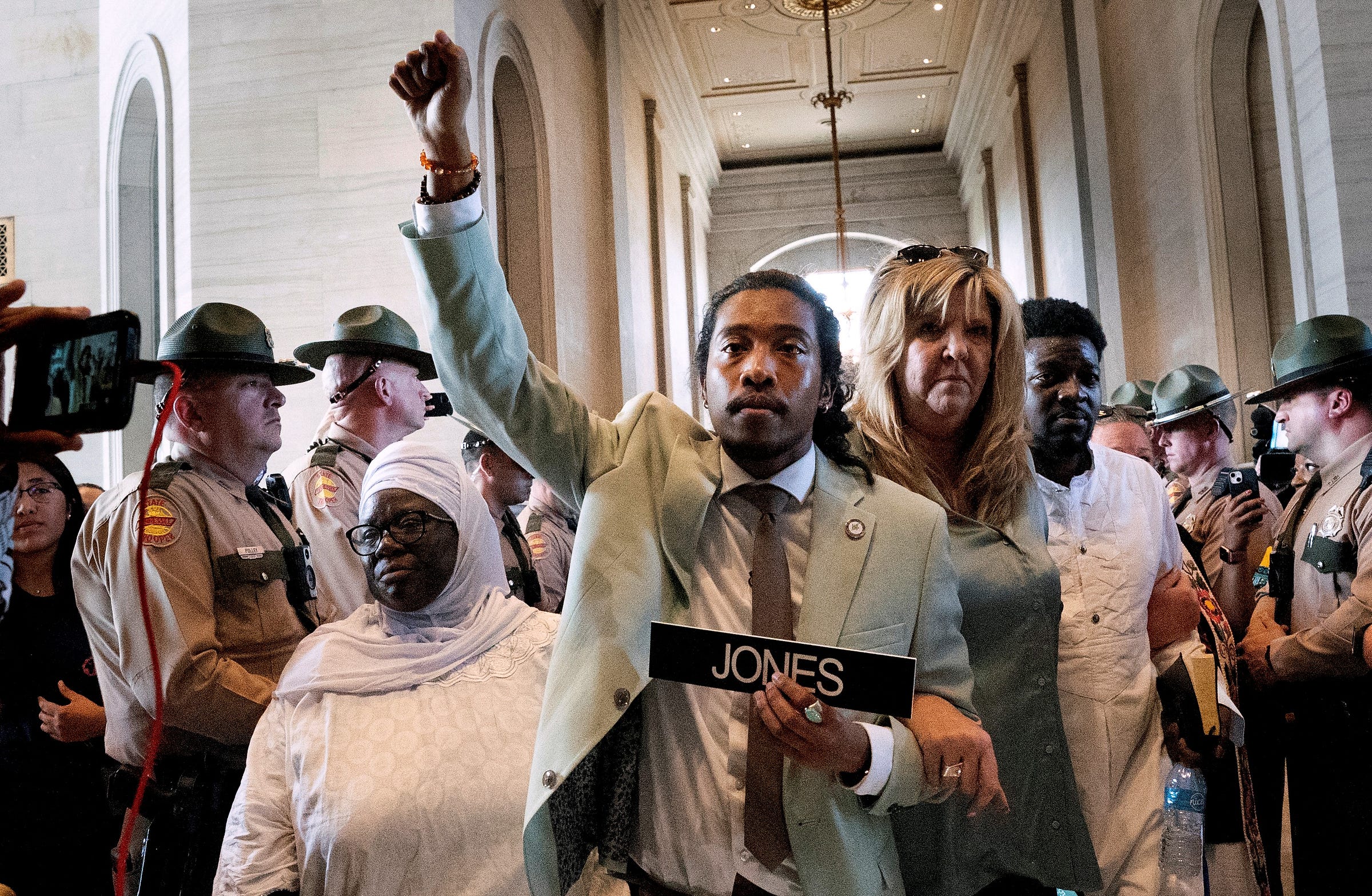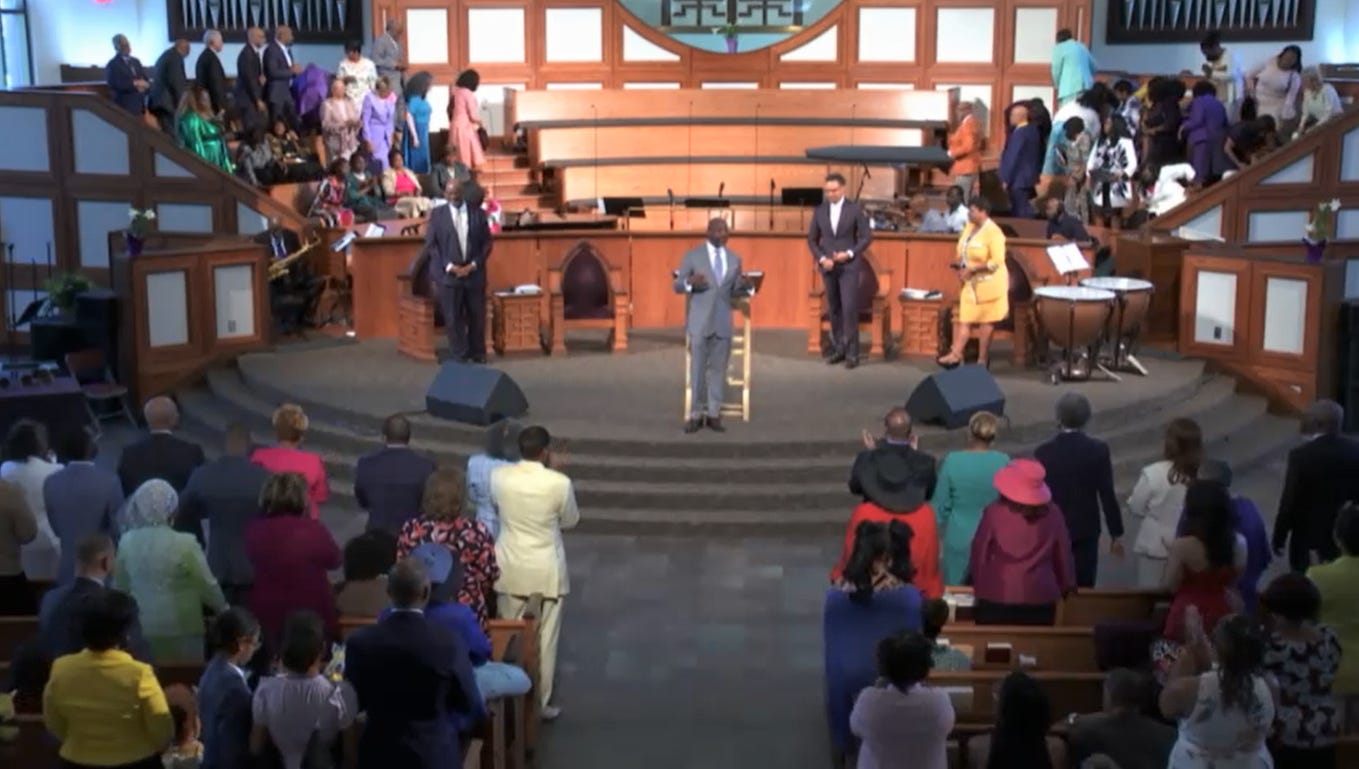Resurrecting Peace
In the Tennessee House of Representatives last week, the words of Jeremiah rang out (the prophet, not the bullfrog). Rep. Justin Jones invoked the words shortly before the Republican supermajority in the House voted to expel him and another Black Democrat from the body for participating in a peaceful protest in the chamber that violated rules of decorum. During the questioning time, one of his Republican colleagues asked him about a chant Jones had joined during the protest following a deadly school shooting in Nashville.
“No action, no peace!”
Jones started his response by inviting the lawmaker to attend protest marches where a more common version of the chant is often heard: “No justice, no peace!” Jones then explained this wasn’t a threat of violence but an explanation that without justice and without action by Tennessee lawmakers toward life-saving gun reforms, then people in the Volunteer State would not experience peace.
“Until we act, there will be no peace in our communities,” Jones said. “Until we act, there will be no peace for thousands of children who came here demanding that we act, who are afraid that if they are in school they’ll be gunned down because you have passed laws to make it easier to get a gun than it is to get health care.”
To further explain the chant, Jones offered two quotations. He noted that Rev. Martin Luther King Jr. explained, “True peace is not merely the absence of tension; it is the presence of justice.” And Jones quoted from Jeremiah 6.
“They dress the wound of my people as though it were not serious. ‘Peace, peace,’ they say, when there is no peace,” read Jones, who was working on a Master of Theological Studies at Vanderbilt Divinity School as he ran for the office last year.
It was just one of several biblical references Jones and Rep. Justin Pearson made during their remarks ahead of their expulsion. A third member who also participated in the protest, Rep. Gloria Johnson, narrowly survived the vote to expel her. The votes not only raised allegations of racism as two Black men were kicked out while a White woman was not, but it also seemed to prove the point of the protest in the first place. Instead of acting on gun reform legislation after a shooter killed three 9-year-old children and three staffers in a Christian school in Nashville, lawmakers instead removed two representatives for speaking out of turn.
Yesterday, just four days after being expelled, Jones was sworn back into the House after being appointed to the vacancy in a unanimous vote by the Nashville Metropolitan Council. Before the vote, supporters gathered for a rally, with some chanting, “No Justin, no peace!”

With the vote to expel the members on Maundy Thursday during Holy Week, it kept the issue of gun violence in the media as Easter approached. In Nashville and beyond, churches have been wrestling with the biblical texts on Jesus’s death and resurrection and the context of our society’s brokenness.
“We have to engage with what has happened,” George Grant, a Nashville Presbyterian leader with ties to The Covenant School and the adjoining Covenant Presbyterian Church, told the Associated Press a few days after the shooting. “The Bible calls us to mourn with those who mourn, to weep with those who weep and so we will.”
On the first Sunday after the massacre, several Nashville preachers addressed the violence while also preaching about the entry of Jesus into Jerusalem on Palm Sunday. Ruth Graham of the New York Times reported on how Christian ministers and musicians in Nashville were wrestling with the news of the violence as Easter neared. And Liam Adams and Keith Sharon of the Nashville Tennessean reported on how more than three dozen churches in the community reflected on death, faith, hope, and the need to end gun violence.
So as the headlines and video reports rippled from Nashville across the country — first after the shooting and then with the expulsion of representatives — we also wondered how ministers might be dealing with Easter in a time of school shootings. This issue of A Public Witness will take you to church to hear how a couple of ministers see the good news of the resurrection giving us a message for the here and now.
What Then Are We to Say?
Beyond Nashville, the tragedies that occurred there did not go unnoticed from church pulpits. Many pastors offered a brave word or prophetic prayer that lamented what has transpired and exhorted followers of the resurrected Jesus to work for life-giving ways of ending gun violence. Here we highlight two of the most prominent examples.
Founded to be a bastion of progressive Christianity, the pulpit of Riverside Church in New York City has proven historically significant and remains an influential platform for American society to hear what mainline Protestants think and believe. In July of 2022, the church called Rev. Adriene Thorne as their first African American female pastor of the congregation dually aligned with American Baptist Churches USA and United Church of Christ. In her inaugural Easter sermon, she addressed the horror that unfolded in the Music City.
“I’m a preacher who has a hard time preaching resurrection disconnected from crucifixion,” Thorne told the faithful gathered under the steeple in Morningside Heights. “For God to give up God’s child knowingly and willingly for the sake of the world is the ultimate act of lavish love.”
“And we know the difference deep inside ourselves when the giving up of our children registers as pointless. We’ve seen it most recently in Nashville. We saw it last May in Uvalde, Texas. And over a decade ago in Sandy Hook, Connecticut. And every time someone writes ‘#ThoughtsAndPrayers’ after another school shooting,” she added. “God knew that the sacrifice of God’s child, Jesus, would benefit us, that it would heal the world. But what about the mommas and pappas whose children are unknowingly and unwillingly sacrificed for our lack of common sense gun laws? That breaks our hearts and it must also break the heart of God.”

Nearly 900 miles south, Rev. Dr. Raphael Warnock, the senior pastor of Atlanta’s Ebenezer Baptist Church and a U.S. senator from Georgia, sounded a similar note. While political opponents previously attacked Warnock over his theology, his Easter sermon on Romans 6 trumpeted the resurrection and testified to the hope it brings. Yet, he also took the opportunity to connect the empty tomb to the violent calamity and resulting political machinations in the Tennessee capital city.
“The question Paul asked and the question I ask this morning is: ‘What then are we to say?’ What then are we to say about a nation so awash in guns and so beleaguered by the weekly violence of mass killings that three 9-year-olds can be slaughtered in a classroom and we continue with business as usual?” he asked the congregation once led by Martin Luther King Sr. and Jr.
Warnock not only addressed the shooting in Nashville but also the political response in the Tennessee House.
“Then when three brave state legislators find the courage to say something and try to push all of us to do something, we witness the Tennessee legislature — not unlike the Georgia legislature — refusing to do anything about the violence. But then responds in the harshest, most racist terms against nonviolent protests,” he said.
“These folks had the unmitigated audacity to expel the two Black young men and leave their courageous White cohort in her seat,” Warnock added. “Some say, ‘Do you think race had anything to do with it?’ Walks like a duck, quacks like a duck, it’s a duck.”

As Warnock continued, he also raised the theological clash embedded in the politics.
“You know, it occurs to me that those legislators who just 10 days after babies were slaughtered in a classroom by a military-style weapon that leaves you unrecognizable … are probably sitting in somebody’s church this Easter Sunday morning singing ‘Amazing Grace,’” he said. “I would want to ask my Christian sisters and brothers sitting in the legislature: Shall we continue in sin — individual sin and collective sin — that grace may abound?”
Shall we, indeed?
New Life Today
Perhaps those lawmakers Warnock mentioned found a sanctuary Sunday that didn’t challenge their inaction. Not all the pastors who mentioned the Nashville school shooting on Easter did so with the same message. As Foxvangelist Robert Jeffress preached at First Baptist Church in Dallas, Texas, about how “the empty grave is important because it exemplifies the victory of God,” he made a passing reference to the shooting. But the point was not to talk about ways of bringing life to this world but to instead assure his congregants that no matter when or how they die, they can live again.
“I’m asked all the time, especially after events like in Nashville a couple of weeks ago, that school shooting: Why did God allow that to happen? Well, the truth is God had nothing to do with it. That’s because of sin and evil that entered into the world,” he said. “The resurrection of Jesus Christ from the dead is just a hint of what God is going to do one day.”
What Jeffress misses but both Thorne and Warnock get correct is that Jesus’s resurrection isn’t solely about punching a ticket to heaven. God’s defeat of death serves as a harbinger of everlasting life, but it also holds important implications for the here and now.
“Embracing the eschaton in preaching does not mean that we proclaim ‘I’ll fly away’ as we wave goodbye to our neighbors in need,” Luke Powery, dean of Duke University Chapel and associate professor of homiletics at Duke Divinity School, wrote in Dem Dry Bones: Preaching, Death, and Hope. “Rather, God’s end shapes the direction in which humans move and work on the earth. Thus, through the Spirit, the future becomes present and the end is already though not yet fully realized.”

To proclaim the resurrection is to believe that death can always lead to life. In the context of gun violence, it’s to heartbreakingly hope that the carnage we’ve witnessed in the past should, and eventually will, motivate state and federal legislators to enact sensible gun laws that reduce future threats. If God triumphs over the grave eternally, then preventing others from falling into early graves is an obvious act of Christian witness. But we have to do something.
“Finish the sermon beyond today,” Thorne encouraged the worshipers at Riverside. “Continue the story beyond this moment.”
Sadly, there’s no way to undo what happened in Nashville, in Uvalde, or in any of the more than 375 school shootings that have happened since Columbine. But there are students, parents, teachers, and pastors imploring our elected leaders to turn these into resurrection stories by preventing future tragedies. So we must continue the sermon: No action, no peace.
As a public witness,
Brian Kaylor & Beau Underwood




If you want peace, work for justice.